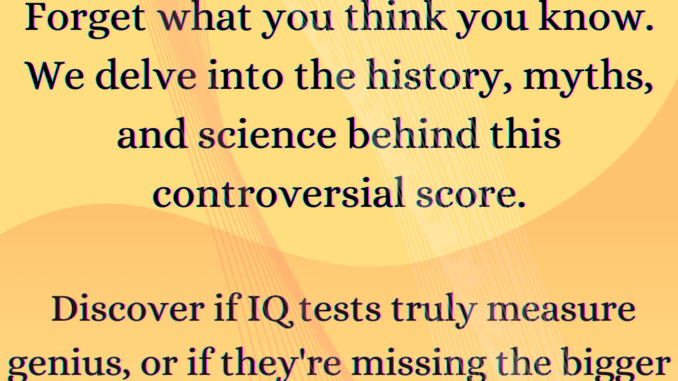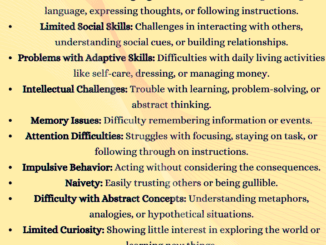
Understanding IQ: A Deep Dive into the Intelligence Quotient
Intelligence Quotient, or IQ, is a widely recognized term, but its true meaning and implications are often misunderstood. This article delves into the world of IQ, exploring its definition, history, assessment methods, and the ongoing debate surrounding its effectiveness.
Definition and History of IQ:
IQ refers to a score derived from standardized tests designed to assess human intelligence. The concept originated in the early 20th century with Alfred Binet and Théodore Simon, who aimed to identify children needing educational support.
William Stern later introduced the idea of an “intelligence quotient” by dividing mental age (derived from test performance) by chronological age. Modern IQ tests don’t use mental age but transform raw scores into a statistically normal distribution with an average score of 100.
Different Theories of Intelligence:
There’s no single agreed-upon definition of intelligence. Some theories emphasize cognitive abilities like reasoning and problem-solving, while others focus on broader aspects like creativity and social skills. Prominent theories include:
- Triarchic Theory (Robert Sternberg): Analyzes intelligence in terms of analytical, creative, and practical skills.
- Multiple Intelligences Theory (Howard Gardner): Proposes eight distinct intelligences, including logical-mathematical, verbal-linguistic, and bodily-kinesthetic.
Read Also:
- Reasons Why Intelligent People Struggle With Love
- Recognizing Signs of Low Intelligence
- Exploring Intelligence Quotes: Insights, Reflections & Inspirations
Measurement and Assessment Tools
IQ Testing
Intelligence Quotient tests are designed to measure a range of cognitive abilities and provide a score intended to serve as a measure of an individual’s intellectual capabilities.
IQ testing involves a series of standardized subtests that measure various cognitive abilities. Common types of IQ tests include:
- Wechsler Adult Intelligence Scale (WAIS): Assesses verbal comprehension, perceptual reasoning, working memory, and processing speed.
- Stanford-Binet Intelligence Scales (SBIS): Caters to a wider age range and includes verbal and nonverbal tasks.
Types of IQ Tests
There are several types of IQ tests, including:
- Stanford-Binet Intelligence Scales: Measures five factors of cognitive ability.
- Wechsler Adult Intelligence Scale (WAIS): Used for adults, measuring verbal comprehension, perceptual reasoning, working memory, and processing speed.
- Wechsler Intelligence Scale for Children (WISC): A version of the WAIS adapted for children.
- Raven’s Progressive Matrices: A non-verbal test typically used to measure abstract reasoning.
Validity and Reliability of Tests
Validity refers to how well a test measures what it claims to measure, while reliability refers to the consistency of the test results over time. A valid IQ test accurately assesses intelligence, and a reliable test produces consistent results.
Cultural and Socio-Economic Biases in Testing
IQ tests have been criticized for cultural and socio-economic biases that can affect test outcomes. These biases may stem from the language used, the context of questions, and the norms against which scores are compared. Test developers strive to minimize these biases, but they remain a significant concern in the field.
IQ Scores:
IQ scores are interpreted based on their position within the normal distribution. A score of 100 represents the average, while scores above 130 and below 70 fall within the very superior and very low ranges, respectively. It’s important to remember that IQ scores are just one piece of the puzzle and shouldn’t be used for definitive judgments about an individual’s potential.
Interpretation of IQ Scores
IQ scores are typically interpreted using a standard scale where the average score is set at 100. Scores are classified into categories such as:
- Below 70: Intellectual disability
- 70-85: Below average
- 85-115: Average
- 115-130: Above average
- 130 and above: Gifted
Distribution of IQ Scores (Normal Distribution)
IQ scores typically follow a normal distribution, forming a bell curve where the majority of scores cluster around the mean (100), and fewer scores appear as they move away from the mean in either direction.
Implications of High and Low IQ Scores
High IQ scores are often associated with academic success and career opportunities, but they don’t guarantee these outcomes. Conversely, low IQ scores can indicate potential learning difficulties, but many individuals with low scores lead fulfilling lives.
High IQ Scores
Individuals with high IQ scores often excel in academic settings and may possess advanced problem-solving and critical-thinking skills. High IQ is correlated with better academic performance and increased career opportunities in intellectually demanding fields.
You can learn about historical accounts of individuals with extraordinarily high IQ scores.
Low IQ Scores
Lower IQ scores can indicate challenges in academic achievement and may require special educational support. However, IQ is not the sole determinant of an individual’s potential or capabilities.
IQ and Life Outcomes
Research suggests a correlation between IQ and academic achievement, but other factors like motivation and work ethic also play a significant role. Similarly, while IQ can influence career opportunities, factors like personality, social skills, and specific skill sets are crucial for career success. The relationship between IQ and social and emotional skills is complex, with some studies showing weak correlations.
Correlation with Academic Success
Research consistently shows a positive correlation between IQ and academic performance, with higher IQ scores generally predicting better grades and higher levels of education.
Impact on Career Opportunities
Higher IQ scores can lead to greater career opportunities, particularly in professions that require complex problem-solving and analytical skills. However, other factors such as emotional intelligence, social skills, and personality traits also play significant roles.
Relationship with Social and Emotional Skills
IQ is only one aspect of intelligence. Social and emotional skills, often referred to as emotional intelligence (EQ), are crucial for personal and professional success. These skills involve the ability to understand and manage emotions, empathize with others, and navigate social complexities.
Criticism and Controversies:
Limitations of Intelligence Quotient as a Measure of Intelligence
Critics argue that IQ tests do not capture the full spectrum of human intelligence. They often overlook creativity, practical problem-solving, and emotional understanding. Furthermore, the emphasis on a single score can be reductive and fail to appreciate the diversity of cognitive abilities.
Ethical Concerns in IQ Testing
There are ethical concerns surrounding IQ testing, particularly related to its use in educational and occupational settings. Issues include the potential for misuse of test results, stigmatization of individuals with lower scores, and the fairness of using IQ tests for high-stakes decisions.
IQ testing faces several criticisms:
- Limited Scope: IQ tests primarily assess cognitive abilities, neglecting other aspects of intelligence like creativity and social skills.
- Cultural Bias: Tests may favor individuals from specific cultural backgrounds.
- Socioeconomic Disadvantage: Socioeconomic factors can hinder test performance.
- Ethical Concerns: Overreliance on IQ scores for educational placement or job opportunities can be unfair.
Alternatives to Traditional IQ Tests:
To address these limitations, alternative assessments have been developed, such as dynamic testing, which focuses on learning potential rather than static knowledge. Other approaches include multiple intelligences assessments and emotional intelligence tests, which offer a broader view of an individual’s capabilities.
Alternative assessments are being explored to provide a more comprehensive picture of intelligence. These may include:
- Gardner’s Multiple Intelligences assessments: Focus on identifying strengths in different areas like music or bodily-kinesthetic intelligence.
- Dynamic assessments: Involve interactive tasks that adapt to the individual’s performance, offering a more nuanced picture of abilities.
In Conclusion:
IQ is a complex topic with a long history. While IQ tests can provide a snapshot of cognitive abilities, they are just one metric and shouldn’t be used for definitive judgments about an individual’s intelligence or potential. Ongoing research and the development of alternative assessments can help us create a more holistic understanding of human intelligence.



5 Trackbacks / Pingbacks
Comments are closed.